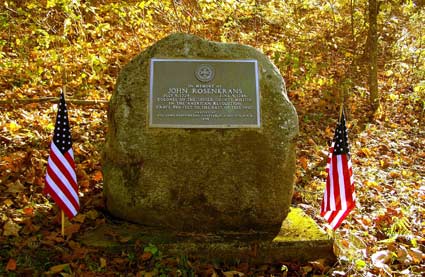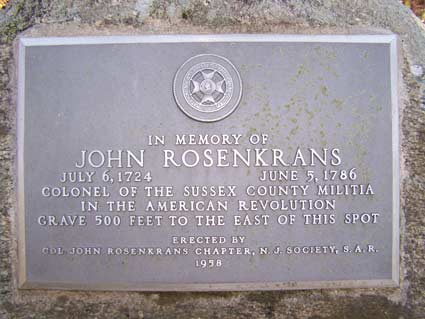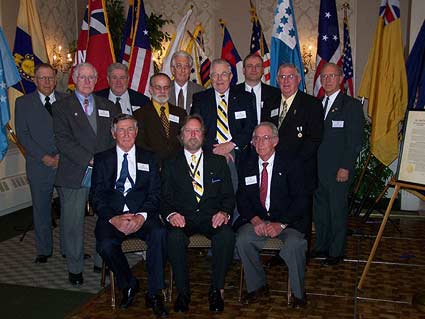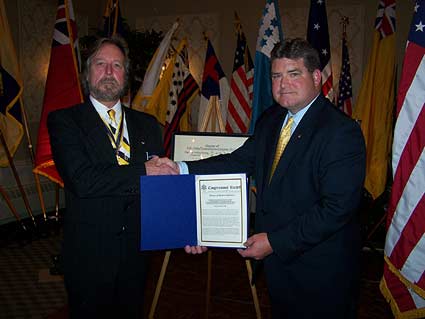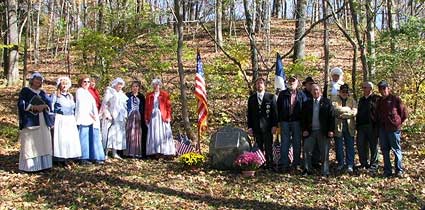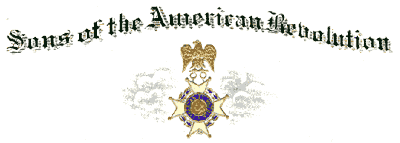
Founded in 1957, covers Warren and Sussex counties in New Jersey.
Gerald G. DeGroat, President
Contact: 908-852-5039
The Col. John Rosenkrans Chapter, New Jersey Society, Sons of the American Revolution, celebrated its 50th anniversary as a state chapter on November 17, 2007 at a gala event held at the Lafayette House, Lafayette, NJ. The Colonial Musketeers Senior Ancient Fife and Drum Corps, dressed in Revolutionary period uniforms, greeted arriving guests with musical selections played on authentic replicas of instruments used in 1776. The American flag and 10 of the 33 historical Revolutionary War battle flags that were on display by the Sons of the Revolution were paraded into the room in a stately procession by members of Sons of the Revolution and Sons of the American Revolution. Chapter President Gerald G. DeGroat extended a warm welcome, introducing the chapter members and honored guests, including two direct descendants of Col. John Rosenkrans, McClellan Rosenkrans (with wife, Gladys) and Lynn Marie Rosenkrans Meyer, as well as the only living charter member, John R. Naisby, III.
Following an exquisite meal that was enjoyed by all, New Jersey Frontier Guard member, Doug Pitchell, in Frontier Guard uniform, gave a description of the responsibilities of the Frontier Guard during the time prior to the Revolutionary War. Glenn Wershing, archeologist, then spoke briefly about the Van Campen Native American artifact collection that chapter member Richard M. Roy displayed at the event. In recognition of the 50th anniversary of the chapter, Senator-elect Steve Oroho presented to President DeGroat a Joint Legislative Resolution from NJ State Senator Robert Littell and Congresswoman Alison McHose and a statement that was entered into the Congressional Record by U.S. Congressman Scott Garrett.
Guest speaker Peter Osborne, Former Executive Director of the Minisink Valley Historical Society, concluded the event with a superb presentation on Fort Decker and a detailed description of the period clothing he was wearing. The nearly 100 guests were encouraged by President DeGroat to view the musical instruments, the Native American artifact collection, the original Col. John Rosenkrans Chapter Charter, the colorful flag display, the original bronze plaque honoring Col. John Rosenkrans and other historical papers that were on display throughout the room.
This celebration marks an important milestone for the Col. John Rosenkrans Chapter. Fifty years ago there were 25 original members. With continued interest in preserving our heritage and with several new members on the horizon, the chapter anticipates many more significant milestones to follow.
Members present at November 17, 2007
50th Anniversary Celebration
Standing from left to right, Martin Little, Arthur R. Dickison, Richard M. Roy, Roland N. Price, III, Donald R. Seath, Kensley R. Thompson, Stephen J. Lance, David H. Naisby, James H. G. Naisby.
Seated from left to right, George A. Dickison, Gerald G. DeGroat, John R. Naisby, III
as submitted from excerpts by John D. Rosenkrans, VI and presented at the
50th Anniversary Ceremony of the re-dedication of the
Col. John Rosenkrans Monument
Colonel John Rosenkrans was born in 1724 at Rochester, NY and died in 1786 at Walpack, NJ. In 1745, Col. John arrived in what is now known as Walpack, along the Old Mine Road, where he purchased Fort Shappanack, which overlooked the Delaware River. Fort Shappanack, which was also known as Fort Johns, was named for the old village in which it stood. The name Fort Johns has been linked to one of three men, its owner, Col. John Rosenkrans, or John Stevens who was responsible for its construction, or John Johnston, who designed forts along the Delaware River. Fort Shappanack, or Fort Johns, existed for about 27 years as a military post or until the end of the Revolutionary War.
After the American Revolution was declared in 1776, John Rosenkrans, on May 23, 1777, enlisted in the 3rd Regiment of the Sussex County Militia. John was commissioned to the rank of Colonel. In 1779 he fought at the Battle of Germantown, PA, accompanying General Sullivan in the campaign against the Indians of the upper Susquehanna and Genesee Valleys. Subsequently, Col. John had been shot in his shoulder, and from the results of this wound, never fully recovered. A physician in Morristown, in the treatment of his wound, scraped the bone of his shoulder, which then caused the wound to grow worse. Col. John died in 1786 and was buried in the old Shappanack Graveyard along the Old Mine Road.
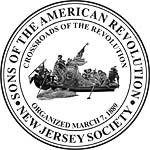
George A. Dickison - Vice President
James H.G. Naisby - Secretary/Treasurer, Past President
Thomas J. Bain, Esq. - Chancellor
Arthur R. Dickison - Historian, Past President
Richard M. Roy - Immediate Past President
Paul J. Checkur
Gerald G. DeGroat
Arthur R. Dickison
Douglas D. Dickison
George A. Dickison
Richard R. Dickison
Vaughn S. Edsall
Fred M. Finkle, Jr.
John E. Idenden, Jr.
Stephen J. Lance
Martin Little
David H. Naisby
James N.G. Naisby
John R. Naisby III
Frederick C. Nelson
William G. Oneal, Jr. ?
Roland N. Price III
John D. Rosenkrans
Richard M. Roy
Claude J. Rutan
Mark G. Rutan
Patrick A. Satter
Donald R. Seath
Kensley R. Thompson
Leslie B. Vail, Jr.
June 11, 2009 - Second Thursday
October 9, 2009 - Second Thursday
December 11, 2009 - Second Thursday
February 11, 2010 - Second Thursday
Sat - Nassau Club, Princeton, NJ, 12:00 pm
Plaque Dedication Ceremony
November 20, 1988 - Col. John Rosenkrans Chapter, NJSSAR
Plaque Re-Dedication Ceremony
November 17, 2007 - Col. John Rosenkrans Chapter, NJSSAR
50th Anniversary Celebration
October 19, 2008 - Col. John Rosenkrans Chapter, NJSSAR
Plaque Re-Dedication Ceremony
Any man is eligible for membership in this Society who is not less than eighteen years of age and who is a citizen of good repute, a lineal descendant from a man or woman who with unfailing loyalty served in the cause of American Independence as a soldier, sailor, marine, or civil officer in the Colonies or States, or as a recognized patriot who materially aided the cause of resistance to the authority of Great Britain.
Historical - To acquire and preserve historic sites, records, documents and relics, erect monuments and encourage research in relation to the American Revolution.
Educational - To maintain and promote institutions for the diffusion of knowledge, affording to everyone the advantage to develop into good American citizens.
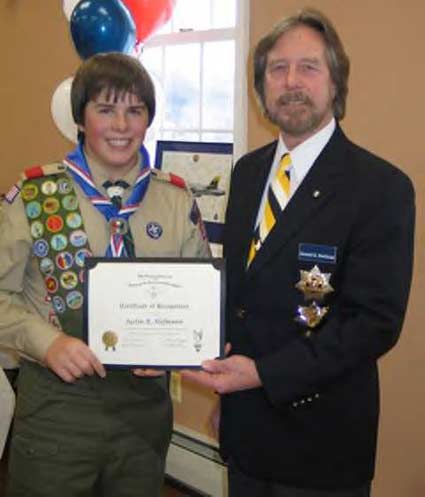
(Excerpts from Chapter History)
The Col. John Rosenkrans Chapter, Sons of the American Revolution, began with an organizational meeting at the Sparta Inn, Sparta, N.J., on December 13th, 1956. At this time there was not officially a chapter in being, and thus a name had not been chosen. A petition was signed applying for the creation of Chapter #22 in the N.J. Society, Sons of the American Revolution.
A second meeting was held January 17th, 1957 at the Cochran House in Newton, NJ, at which time the name Col. John Rosenkrans Chapter was unanimously adopted and a committee was appointed to locate the gravesite of Col. John Rosenkrans and was also to select a site for an appropriate monument. As noted, Col. John Rosenkrans was perhaps the most outstanding Revolutionary War patriot of Sussex County, NJ.
A third meeting was held on March 21st, 1957, at Jorgensen's Inn, Stockholm, NJ. Compatriot Hurlburt reported that he had located the general area of the gravesite of Col. John Rosenkrans, yet the actual grave could not be found. This area was identified as being in Walpack and along the Old Mine Road. Compatriot Hurlburt reported finding a suitable site for a monument. The site was located on property owned by Compatriot Fred 0. Schnure. Compatriot Schnure at that time was not a member, but later joined and served several terms as President.
At a meeting in 1958, discussion on the Rosenkrans monument terminated in the decision that it should take the form of a boulder and bronze plaque. President John R. Naisby, selected a boulder near his property and, with the help of Compatriot Gilbert Banks and along with his equipment, moved it to his yard and then installed the plaque.
With the help of Compatriot Hurlburt, Stanley Dunn, Banks and Schnure, and with "Gibby" Banks's equipment, the boulder was transferred to the predetermined location on the Old Mine Road, near the Van Campen Inn and, after being properly placed, a concrete base was poured around it.
Dedication ceremonies were conducted on November 11, 1958 and in attendance were a number of local dignitaries. Dr. Edna Rosenkrans and Mrs. Ralph Decker performed the unveiling.
On November 20, 1988, after vandals had removed the original plaque from the monument, a new plaque was dedicated at a ceremony during Van Campen Day.
Re-dedication ceremonies were conducted once again on October 19, 2008 during Van Campen Day for the 50th Anniversary of the placement of the stone monument and also the 20th Anniversary of the replacement plaque.
